Alex
Kingdom of Greece
- Apr 16, 2019
- 4,954
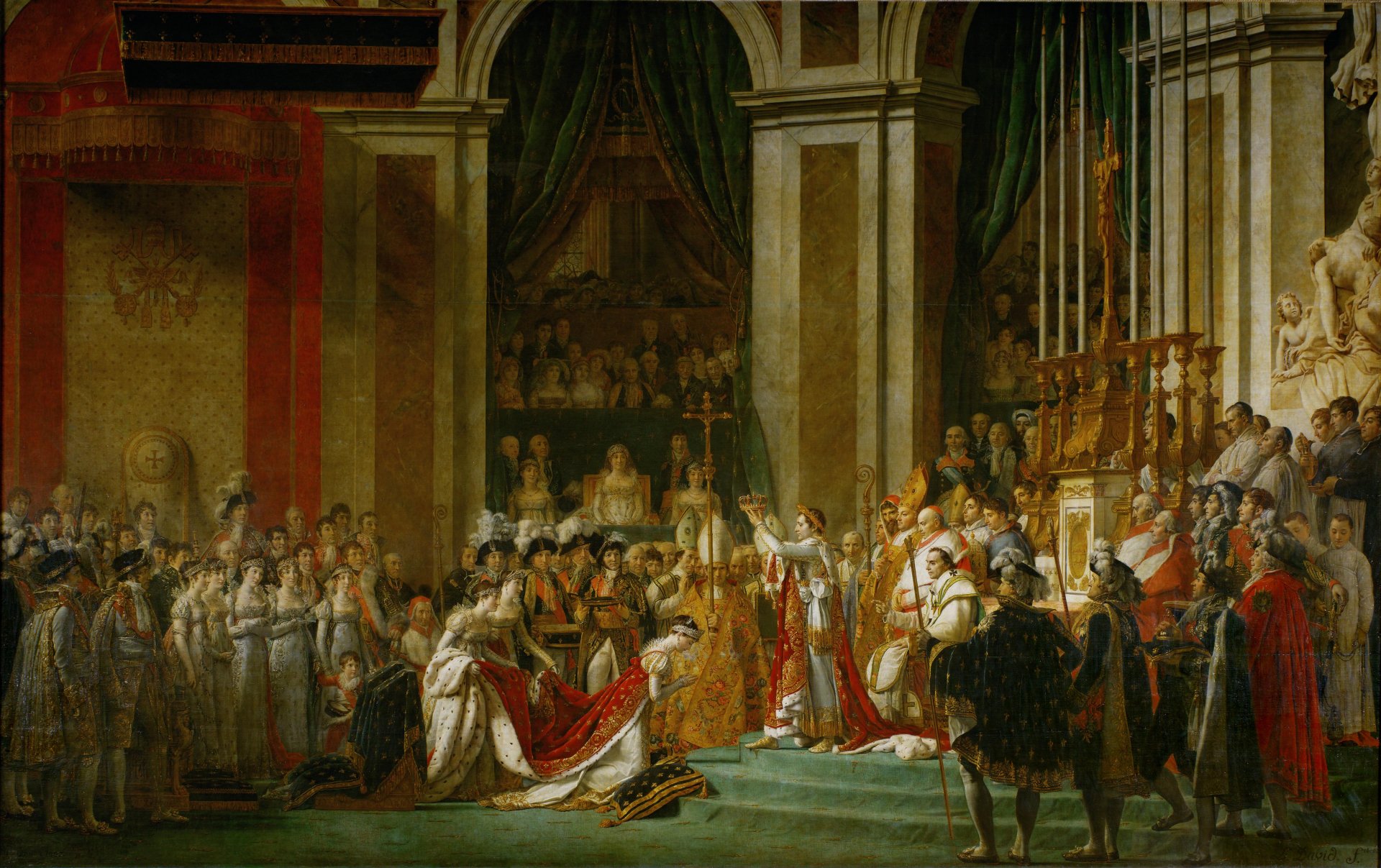
The History of France
1944-Present
1944-Present


| On the 3rd of June 1944, Charles de Gaulle became the head of the Provisional Government of the French Republic and retained his position as Head of State of the nation throughout the rest of the Second World War and into the Cold War. In an effort to keep stability within France, the fear of Soviet influence in the nation being strong, de Gaulle formed a tri-partisan alliance of the Communist Party of France, the French Section of the Workers' International, and the Popular Republican Movement. Under this alliance, France begins to rebuild with an aim of establishing the Fourth Republic and avoid the mistakes that came with the republic before it—having been marked by constant political instability and chaos until its dismantlement by the Nazis in 1939. In 1946, a crisis erupts between Charles de Gaulle and the Provisional Government. Charles de Gaulle favored a presidential style of government with a powerful executives clashed with the communists' desire for a system that placed greater power within the National Assembly. This led to de Gaulle fearing a repeat of the mistakes of the Third Republic and thus he threatens the alliance with resignation—risking complete collapse of the alliance and the French government. Charles de Gaulle's resignation, however, is prevented once the other two members of the alliance eject the Communist Party of France, reducing the coalition to two parties, with the CPF becoming opposition. By 1949, de Gaulle's method of badgering the ruling coalition into submission with threats of resignation finally lose their effect and de Gaulle's resignation is accepted when he attempts to enforce sweeping changes on the new consitution set to transition France from its provisional government to a post-war democracy. After five years, de Gaulle's position as chairman comes to an end. With a referendum showing 53% approval, the new French constitution is accepted and the foundations of the Fourth French Republic begins. |
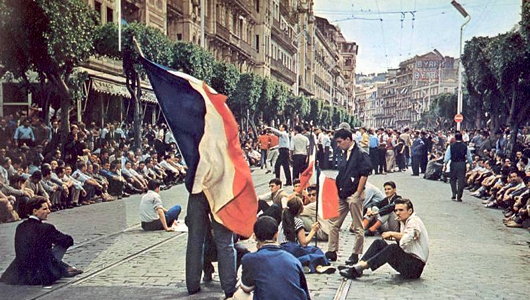
| Throughout the short existence of the Fourth Republic, the issues which de Gaulle foresaw in the Constitution revealed themselves quickly. Political instability and deadlocks caused the rapid collapse of the French Empire. One by one, Presidencies ended in disasters with the next President performing worse as the French began losing pieces of their empire through great and bloody revolts. One by one, the French were forced to withdraw and grant independence to its colonies in a series of military defeats. Soon, political instability at home began to rise up, stemming from domestic unpopular opinion of withdrawing from what is perceived to be rightful French territory. By the close of the 1950s, the military has lost patience and belief in the Fourth Republic. Many Presidents and their cabinets had cost too many lives of French soldiers, only for them to surrender and grant independence for the lands the military had laid their lives down for. Plans begin to form among disenchanted French generals, who become nostalgic of de Gaulle's rule. Convinced that France is destined to be led by a leader of strength and determination, these generals plot to overthrow the Fourth Republic if de Gaulle was not permitted to return to power. As a show of their strength and seriousness, Operation Corse, the bloodless seizure of the island of Corsica, occurs on the 13th of May 1959. Faced with the possibility of being overthrown by the military, the government and assembly vote to bring de Gaulle back into power. During the mid 1950s, de Gaulle had met with the Duke of Segovia, the Legitimist pretender to the French throne. During this time, de Gaulle and his party and supporters slowly began to publicize monarchism and the Legitimist position as the true French sovereigns. By the end of the 1950s, with de Gaulle having taken power once more, a large percentage of the French population supported a potential restoration of the monarchy, but this support was not large enough for the majority and thus de Gaulle delayed a referendum. Charles de Gaulle would remain President of the unofficial Fifth French Republic for nearly another decade. |
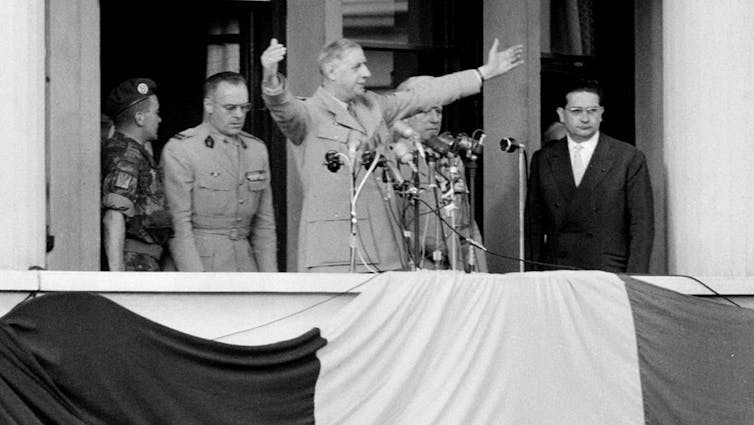
| Near the end of 1959, de Gaulle rewrote the Constitution of France founded the Fifth Republic of France after approval by referendum. Starting in 1959, de Gaulle and his government begin discussing the possibility of assuring a strong head of state to assure the survivability of the Fifth Republic. While de Gaulle held a lot of power as President in his new constitution, a monarchy would prove to be more beneficial in assuring continuation and to assure that communism would never take hold in France. Many options were discussed for who would sit on the throne were they to restore the crown. One of de Gaulle's ministers suggested a possible Union between the United Kingdom and France, but was quickly fired. By the end of the year it was decided that Alfonso, Duke of Anjou and Cadiz, would be their best option. Moves would begin to be made to move towards a constitutional monarchy where the President and the Crown would share powers. They hoped to write and vote on this referendum by the end of de Gaulle's term in 1966. Extreme efforts were also taken to fix the mistakes of the Fourth Republic and the demise of the French Colonial Empire. This included focusing on mending relations with other nations following the Fourth Republic's various wars and massacres in Western Africa. However, de Gaulle continued his stance of anti-America and anti-Soviet influence in Europe and continued to deny British influence in various arenas due to their close ties with the Americans. Nearing the end of the 1960s, France would be changed forever. |
| Slightly behind schedule, de Gaulle's new monarchist constitution is completed and after some fifteen years, the support for monarchism had grown within the populace and the most easily influenced were now able to vote. In France, the vote for a monarchy came back with a result of 57.82% in favor. The end of the Fifth Republic and rebirth of the Kingdom of France under King Alphonse II takes place in 1968. Extreme measure were taken to promote the monarchy in metropolitan and overseas France. Palaces and various other locations are given to the House of Bourbon by the French government. Alphonse II and de Gaulle's close relationship would prove beneficial during the birth of the new government. However, the many communists that remained within France began arming and planning against this new government. With the internal government of France being officially secured, according to de Gaulle, the Kingdom begins to focus on the global state of the world and begins mass-focus on their military. |
| On the 22nd of November 1970, de Gaulle is targeted for death by the French communists, in retaliation for his "betrayal of the Republic and the French people" by restoring the monarchy. On this day, he and his wife were trapped in an organized machine gun ambush in their Citroen DS limousine. De Gaulle, his wife, and their chauffeur were all killed. On the same day, a mysterious cable car accident in the Swiss Alps results in the sudden deaths of King Alphonse II and his son, Louis Alphonse. The deaths of Charles de Gaulle and the royal family caused the greatest crisis in France since the Second World War as the throne sat empty and France was on the brink of civil war against the communists—France was leaderless and in complete chaos. Quickly, the National Assembly elects a temporary Prime Minister to act as both Head of State and Head of Government and begin talks with the Orleanist branch as a suitable replacement for King Alphonse II. Communist insurgencies begin to spring up all across France and its overseas territories and soon the French military is called upon to restore order. In December, only weeks after the assassinations, the throne remains empty and the insurgencies grow. In the streets of Paris, a group of students begin to wave flags bearing symbols not seen in decades, and begin to chant: "All that is the nation, is ours!" Quickly, their numbers grow and they begin demanding the installation of a Bonapartist upon the throne. By the dawn of 1971, the nation lacked a monarch. With the aid of the Foreign Legion and military contacts during his service in WW2, Louis, Prince Napoléon, storms Paris. The capital is overwhelmed and the coup sees the military install Prince Napoléon on the throne as Emperor Napoléon VI and the nation becomes the Third French Empire. The French Action, the party which led the student protests in Paris, takes control of the National Assembly. All communist parties are banned and the practice of the ideology is outlawed in the nation. The French military heavily cracks down on the insurgencies. With an Emperor at the helm, chaos begins to subside, and France slowly returns to order. |
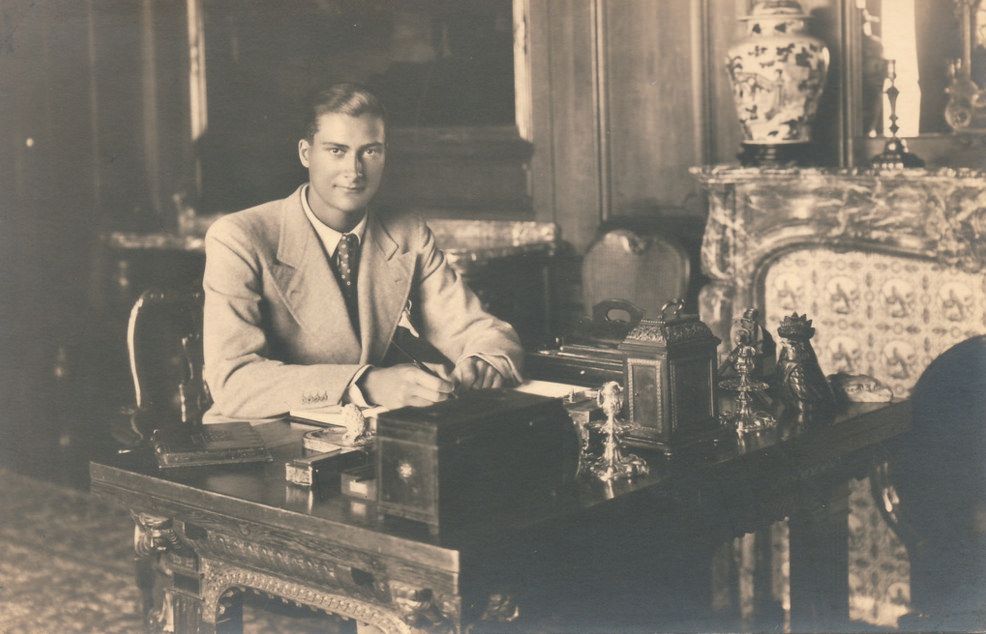
| The reign of Emperor Napoleon VI mostly focused on domestic and internal development. Communism was stripped from France, cracked down upon by military might. By the dawn of the 1980s, all French communists were either killed, arrested, fled overseas to places like Guiana, or kept their beliefs secret. The nation was rebuilt, repairing the damages done by the communist insurgents. Most communists still willing to fight did so in the thick jungles of French Guiana, fighting against the French Foreign Legion. By the dawn of the 1990s, however, they had been starved out and communism within France came to an end. Other forms of extremism were tackled by Napoleon VI: mainly far-right extremism. Outlawing fascism and similar ideologies and banning any party which followed these ideologies. With the aid of the military, no insurgencies regarding these bans rose. While minimal in numbers, France still participated in foreign wars: such as the Western Sahara War which sprung up in 1975, Shaba I, the Chadian-Libyan Conflict, and so on. The majority of France's forces and focus, however, were at tackling internal conflicts such as the Corsican Conflict and the Basque Conflict. The economy flourished, stability was stronger than ever, and France finally had a strong nation and head of state under Napoleon VI. After sixteen years of reign, Emperor Napoleon VI passed away at the age of 73. His son succeeded him, becoming Emperor Napoleon VII. |
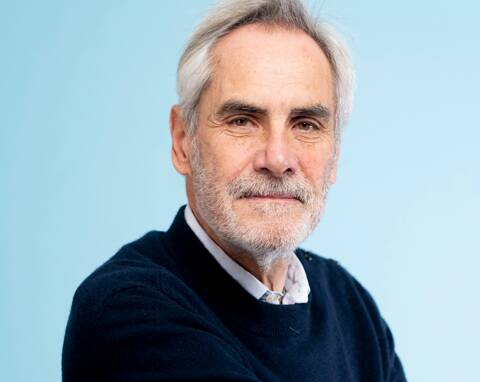
| During the course of the reign of Napoleon VII, the Emperor, being much more religious than his predecessor, had engaged in a campaign of gradual reform of the French Imperial Institutions, slowly morphing the French Empire into a theocratic state. While the country, officially remains the Third French Empire, internally, it is referred to as "The Heavenly Order". Napoleon VII and the monarch of France in general, is seen as the head of this new branch of Christianity. This leads to a rift with the Vatican for a time. However, Napoleon VII and the Pope are able to negotiate a deal where this new branch of Christianity will still hold communion with the Pope while retaining autonomy, becoming a Rite. This new form of Christianity begins to be called "Franco-Christianity" due to its many divergences from other Christian beliefs. One of which is the belief that Jeanne d'Arc, patron saint of France, was not only a messenger of God but a Messiah for the French people—sent by God to liberate and lead them against all enemies. With a worship of Jeanne growing, a sense of "Chosen People" also began within the French people and soon Jeanne d'Arc became as important as God, as important as Jesus, as important as the Emperor. During his reign, Napoleon VII began the construction of the Archbasilica Cathedral of the Holy Savior of France and Saint Jeanne d'Arc, the center of Franco-Christianity, in Avignon. A building so large that it took twelve years to build. Nearing the end of his reign, with declining health, Napoleon VII named his daughter Jeanne Bonaparte his heir, instead of his eldest son Jean. Prince Jean Bonaparte held strong views against Franco-Christianity and was thus denied his inheritance. Once his father's will was signed, Prince Jean Bonaparte fled the country. On the 15th of April 2000, Emperor Napoleon VII died and his daughter succeeded him the next day as Empress Jeanne I Bonaparte. |


